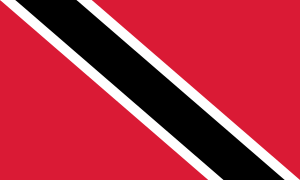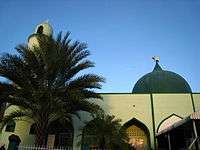Religion in Trinidad and Tobago
| Part of a series on the |
| Culture of Trinidad and Tobago |
|---|
 |
| History |
| People |
| Cuisine |
|
|
Music and performing arts |
|
Media |
| Sport |
|
Trinidad and Tobago is a multi-religious nation. The largest religious groups are the Protestant Christians (including Anglicans, Presbyterians, Methodist, Evangelicals, Pentecostals and Baptist), Roman Catholic Christians, Hindus; and Muslims. Two Afro-Caribbean syncretic faiths, the Shouter or Spiritual Baptists and the Orisha faith (formerly called Shangos, a less than complimentary term) are among the fastest growing religious groups. The fastest growing groups are a host of American-style Evangelical and Fundamentalist churches usually grouped as "Pentecostal" by most Trinidadians (although this designation is often inaccurate). The Church of Jesus Christ of Latter-day Saints has also expanded its presence in the country since the mid-1980s.
According to the 2011 Census, 33.4% of the population was Protestant (including 12.0% Pentecostal, 5.7% Anglican, 4.1% Seventh-day Adventist, 3.0% Presbyterian or Congregational, 1.2% Baptist, and 0.1% Methodist), 21.5% was Roman Catholic, 18.1% was Hindu, and 5% was Muslim. A small number of individuals subscribed to traditional Caribbean religions with African roots, such as the Spiritual Baptists (sometimes called Shouter Baptists) (5.7%); and the Orisha (0.1%). The smaller groups were Jehovah's Witnesses (1.5%) and unaffiliated (2.2%). There are also small, but active, Buddhist and Jewish communities on the island.[2]
Christian denominations

- Roman Catholic Church (see Roman Catholicism in Trinidad and Tobago)
- Anglican Church of Trinidad and Tobago
- Presbyterian Church of Trinidad and Tobago
- Methodist Church of Trinidad and Tobago
- New Testament Church of God (see Church of God (Cleveland, Tennessee)
- Church of God of Prophecy
- Open Bible Standard Churches
- Pentecostal Assemblies of the West Indies
- South Caribbean Conference of the Seventh-day Adventist Church
- Moravian Church of Trinidad and Tobago
- Church of the Nazarene Trinidad & Tobago District
- Church of God
- London Baptist
- Evangelical Baptist
- Ethiopian Orthodox Church
- Independent Baptist
- Stewards Christian Bretheren
- The Church of Jesus Christ of Latter-day Saints (Mormons)
- Association of Jehovah's Witnesses
Afro-Caribbean syncretic groups
- Spiritual Baptist
- National Evangelical Spiritual Baptist
- West Indies Spiritual Sacred Order
- Royal Priesthood Spiritual Baptist Archdiocese of Trinidad and Tobago and the Western Hemisphere (under the Leadership of the Archbishop & Founder Addelon Braveboy, the Episkopos Bishop of all the Churches of the Royal Priesthood)
- King of Kings Spiritual Baptist, Faith Ministries International Church of the Royal Priesthood
- Solomon Healing Temple, Church of the Royal Priesthood.
- St Francis Divine Healing Temple, Church of the Royal Priesthood
- St Philomena Mystical Court, Church of the Royal Priesthood
- Santería
- Orisha also known as Shango or Ifá
- Ojubo Orisa Omolu - Ose'tura Ifa Temple of Light.
- Rastafari
- Nation of Islam
Hindu groups
- Sanatan Dharma Maha Sabha
- Vishwa Hindu Parishad
- Kabir Panth Association
- Arya Pratinidhi Sabha
- Shiva Dharma Sabha
- Divine Life Society
- International Society for Krishna Consciousness
- SWAHA
- Hindu Festivals Society of Trinidad and Tobago
Islamic groups
- Ahmadiyya Muslim Community of Trinidad and Tobago
- Anjuman Sunnat-ul-Jamaat Association
- Tackveeyatul Islamic Association
- Trinidad Muslim League
- United Islamic Organisation of Trinidad and Tobago
- Muslim Social and Cultural Foundation
- Ahmadiyya Anjuman Ishaat-i-Islam Trinidad & Tobago Inc.
Jewish groups
Jewish settlement in Trinidad and Tobago dates back to the 17th century when a number of Jewish merchants from Suriname settled in the 1660s, when the island was still under Spanish control. By the 1790s, when it passed into British hands, the community had disappeared from record.[3]
In the 19th century a small number of Sephardi Jewish families from Curaçao settled in Trinidad but left no trace of an organised community.[4] In the late 1930s an estimated six hundred East European Jews settled in Trinidad, mainly Port of Spain, escaping the growth of Nazism in the region. The settlers established synagogues in rented houses in the capital and consecrated a Jewish cemetery. After World War Two the majority of Trinidadian Jews migrated to the United States and Canada. In 2007 an estimated 55 Jews lived in Trinidad and Tobago.[5]
Baha'i Faith
The Bahá'í Faith in Trinidad and Tobago begins with a mention by `Abdu'l-Bahá, then head of the religion, in 1916 as the Caribbean was among the places Bahá'ís should take the religion to.[6] The first Bahá'í to visit came in 1927[7] while pioneers arrived by 1956[8] and the first Bahá'í Local Spiritual Assembly was elected in 1957[9] In 1971 the first Bahá'í National Spiritual Assembly was elected.[10] A count of the community then noted 27 assemblies with Bahá'ís living in 77 locations.[11] Since then Bahá'ís have participated in several projects for the benefit of the wider community and in 2005/10 various sources report near 1.2% of the country,[12] about 10[13]–16,000[14] citizens, are Bahá'ís.
Government subventions
The Government of Trinidad and Tobago provides substantial subventions to religious groups. In 2003 the government provided TT$ 420,750 to religious groups.
References
- ↑ 2011 National census. cso.gov.tt
- ↑ 2011 census
- ↑ Siegel, Alisa (2015). "Judaism - Trinidad". In Taylor, Patrick. The Encyclopedia of Caribbean Religions. University of Illinois Press. pp. 459 – 461.
- ↑ Arbell, Mordehay (2002). The Jewish Nation of the Caribbean: The Spanish-Portuguese Jewish Settlements in the Caribbean and the Guianas. Gefen Publishing House. pp. 314 – 316. ISBN 9789652292797.
- ↑ Luxner, Larry (16 September 2007). "Trinidad's Jews stick together". Jewish Telegraphic Agency. Retrieved 23 June 2016.
- ↑ Abbas, `Abdu'l-Bahá; Mirza Ahmad Sohrab; trans. and comments (April 1919). Tablets, Instructions and Words of Explanation.
- ↑ Universal House of Justice (1986). In Memoriam. The Bahá'í World. XVIII. Bahá'í World Centre. pp. 733–736. ISBN 0-85398-234-1.
- ↑ "The Guardian's Message to the Forty-Eighth Annual Baha'i Convention". Bahá'í News. No. 303. May 1956. pp. 1–2.
- ↑ "First Local Spiritual Assembly…". Bahá'í News. No. 321. November 1957. p. 8.
- ↑ "A Year of Progress in Trinidad". Bahá'í News. No. 480. March 1971. pp. 8–9.
- ↑ "Outstanding Achievements, Goals". Bahá'í News. No. 484. July 1971. p. 3.
- ↑ "International > Regions > Caribbean > Trinidad and Tobago > Religious Adherents". thearda.com. thearda.com. 2010. Retrieved 2013-06-13.
- ↑ "The History of the Bahá'í Faith in Trinidad and Tobago". The National Spiritual Assembly of the Bahai´s of Trinidad and Tobago. 2010. Retrieved June 8, 2013.
- ↑ "Most Baha'i Nations (2005)". thearda.com. thearda.com. 2005. Retrieved 2008-12-04.
